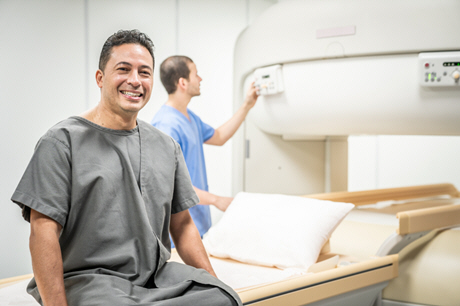Introduction
Urology, the branch of medicine that focuses on the urinary tract and male reproductive system, is surrounded by numerous myths and misconceptions. For American men, understanding the facts about urological health is crucial for maintaining well-being and preventing serious conditions. This article aims to dispel common myths and provide accurate information on key urological topics.
Myth: Prostate Cancer Only Affects Older Men
While it is true that the risk of prostate cancer increases with age, it is not exclusively an older man's disease. Prostate cancer can occur in men of all ages, including those in their 40s and 50s. The American Cancer Society recommends that men discuss prostate cancer screening with their healthcare provider starting at age 50, or earlier if they have a family history or are of African American descent. Early detection can significantly improve outcomes, making it essential for men of all ages to be aware of their prostate health.
Fact: Regular Screening Can Save Lives
Regular screening for prostate cancer, such as the prostate-specific antigen (PSA) test and digital rectal exam (DRE), can detect the disease in its early stages when it is most treatable. The U.S. Preventive Services Task Force (USPSTF) suggests that men aged 55 to 69 should make an individual decision about screening based on their values and preferences. It is important for men to have open discussions with their doctors about the benefits and potential risks of screening to make informed decisions about their health.
Myth: Frequent Urination Is Normal as You Age
Many men believe that frequent urination is an inevitable part of aging. However, while it is common, it is not normal and may be a sign of underlying conditions such as benign prostatic hyperplasia (BPH), urinary tract infections, or diabetes. BPH, an enlargement of the prostate gland, can cause urinary symptoms like frequent urination, urgency, and difficulty starting or stopping the urine stream. Men experiencing these symptoms should consult a urologist to determine the cause and explore treatment options.
Fact: Lifestyle Changes Can Improve Urinary Health
Making certain lifestyle changes can significantly improve urinary health. For instance, reducing caffeine and alcohol intake, maintaining a healthy weight, and practicing pelvic floor exercises can help manage symptoms of BPH and other urinary issues. Additionally, staying hydrated and avoiding bladder irritants like spicy foods can contribute to better urinary function. Men should work with their healthcare providers to develop a personalized plan to address their specific needs.
Myth: Erectile Dysfunction Is Only a Psychological Issue
Erectile dysfunction (ED) is often mistakenly thought to be solely a psychological problem. While psychological factors can contribute to ED, the condition is frequently linked to physical causes such as cardiovascular disease, diabetes, and hormonal imbalances. In fact, ED can be an early warning sign of heart disease. Men experiencing ED should seek medical evaluation to identify and treat any underlying health issues.
Fact: Effective Treatments for ED Are Available
There are numerous effective treatments for ED, ranging from oral medications like sildenafil (Viagra) to more invasive options such as penile implants. Lifestyle modifications, such as quitting smoking, exercising regularly, and managing stress, can also improve erectile function. Men should consult with a healthcare provider to explore the most suitable treatment options based on their individual health profile and preferences.
Conclusion
Understanding the facts about urological health is essential for American men to maintain their well-being and address potential issues proactively. By debunking common myths and embracing accurate information, men can make informed decisions about their health and seek appropriate medical care when needed. Regular check-ups, open communication with healthcare providers, and a commitment to a healthy lifestyle are key steps toward optimal urological health.
Contact Us For A Fast And Professional Response

- Urological Health and Sexual Wellness: A Comprehensive Guide for American Men [Last Updated On: March 8th, 2025] [Originally Added On: March 8th, 2025]
- Hydration's Vital Role in Urological Health for American Males [Last Updated On: March 18th, 2025] [Originally Added On: March 18th, 2025]
- Genetic Insights into Prostate Cancer, BPH, and Kidney Disease in American Men [Last Updated On: March 18th, 2025] [Originally Added On: March 18th, 2025]
- Managing Urological Pain: Causes, Diagnosis, and Treatment Strategies for Men [Last Updated On: March 18th, 2025] [Originally Added On: March 18th, 2025]
- Urological Infections in Men: Causes, Prevention, and Management Strategies [Last Updated On: March 18th, 2025] [Originally Added On: March 18th, 2025]
- Urological Health Strategies for American Men in the Workplace [Last Updated On: March 18th, 2025] [Originally Added On: March 18th, 2025]
- Heart and Urology: Interconnected Health in American Men [Last Updated On: March 19th, 2025] [Originally Added On: March 19th, 2025]
- Urological Health and Fertility: Conditions, Diagnosis, and Management for American Males [Last Updated On: March 19th, 2025] [Originally Added On: March 19th, 2025]
- Urological Innovations Enhancing Care for American Males: Trends and Advancements [Last Updated On: March 19th, 2025] [Originally Added On: March 19th, 2025]
- Exercise Routines to Enhance Urological Health in American Men [Last Updated On: March 19th, 2025] [Originally Added On: March 19th, 2025]
- Smoking's Detrimental Effects on Urological Health in American Men [Last Updated On: March 20th, 2025] [Originally Added On: March 20th, 2025]
- Urological Health Guide for American Men: Symptoms, Detection, and Management [Last Updated On: March 21st, 2025] [Originally Added On: March 21st, 2025]
- Urological Health Essentials for American Males: Screenings, Lifestyle, and Education [Last Updated On: March 21st, 2025] [Originally Added On: March 21st, 2025]
- Urological Health Essentials for American Male Athletes: Risks, Prevention, and Care [Last Updated On: March 22nd, 2025] [Originally Added On: March 22nd, 2025]
- Understanding Urological Insurance Coverage: A Guide for Men [Last Updated On: March 22nd, 2025] [Originally Added On: March 22nd, 2025]
- Specialized Urological Care and Services for American Veterans [Last Updated On: March 23rd, 2025] [Originally Added On: March 23rd, 2025]
- Urological Health's Psychological Impact on American Men: Addressing Stigma and Support [Last Updated On: March 23rd, 2025] [Originally Added On: March 23rd, 2025]
- Urological Health in Aging Men: Screening, Lifestyle, and Advances in Treatment [Last Updated On: March 23rd, 2025] [Originally Added On: March 23rd, 2025]
- Stress and Urological Health in American Males: Impacts and Management Strategies [Last Updated On: March 23rd, 2025] [Originally Added On: March 23rd, 2025]
- Dietary Strategies for Enhancing Urological Health in American Men [Last Updated On: March 23rd, 2025] [Originally Added On: March 23rd, 2025]
- Supplements and Urological Health: A Guide for American Men [Last Updated On: March 23rd, 2025] [Originally Added On: March 23rd, 2025]
- Obesity's Impact on Urological Health in American Men: Risks and Mitigation Strategies [Last Updated On: March 24th, 2025] [Originally Added On: March 24th, 2025]
- Urological Health in Young American Males: Importance of Early Detection and Screening [Last Updated On: March 24th, 2025] [Originally Added On: March 24th, 2025]
- Urological Surgery Recovery Guide for American Males: Tips and Strategies [Last Updated On: March 24th, 2025] [Originally Added On: March 24th, 2025]
- Urological Health and Cancer: Risks, Prevention, and Early Detection in American Males [Last Updated On: March 24th, 2025] [Originally Added On: March 24th, 2025]
- Urological Health's Impact on Mental Well-being in American Men: A Holistic Approach [Last Updated On: March 25th, 2025] [Originally Added On: March 25th, 2025]
- Urological Health: Essential Preventive Care for American Men's Well-being [Last Updated On: March 25th, 2025] [Originally Added On: March 25th, 2025]
- Urological Health in American Men: Conditions, Prevention, and Holistic Care [Last Updated On: March 25th, 2025] [Originally Added On: March 25th, 2025]
- Urological Health: Key to Fertility and Family Planning for American Males [Last Updated On: March 25th, 2025] [Originally Added On: March 25th, 2025]
- Environmental Factors Impacting Urological Health in American Males: Risks and Prevention [Last Updated On: March 25th, 2025] [Originally Added On: March 25th, 2025]
- Urological Health and Sleep Quality: A Vital Connection for American Men [Last Updated On: March 25th, 2025] [Originally Added On: March 25th, 2025]
- Managing Urological Health: Essential Travel Tips for American Men [Last Updated On: March 26th, 2025] [Originally Added On: March 26th, 2025]
- Urological Health Guide: Procedures, Diagnosis, and Care for American Males [Last Updated On: March 26th, 2025] [Originally Added On: March 26th, 2025]
- Urological Rehabilitation: Enhancing Urinary, Sexual, and Prostate Health for American Men [Last Updated On: March 26th, 2025] [Originally Added On: March 26th, 2025]
- Empowering Men: Integrating Urology into Sexual Health Education in the U.S. [Last Updated On: March 26th, 2025] [Originally Added On: March 26th, 2025]
- Urological Health and Immunity: Strategies for American Males [Last Updated On: March 26th, 2025] [Originally Added On: March 26th, 2025]
- Urological Health: Key to Longevity for American Men [Last Updated On: March 26th, 2025] [Originally Added On: March 26th, 2025]
- Technological Advances in Urological Diagnosis for American Males: Imaging, Minimally Invasive Procedures, and Beyond [Last Updated On: March 26th, 2025] [Originally Added On: March 26th, 2025]
- Exercise Benefits and Safe Practices for Urological Health in American Males [Last Updated On: March 26th, 2025] [Originally Added On: March 26th, 2025]
- Medications' Impact on Urological Health in American Men: A Comprehensive Overview [Last Updated On: March 26th, 2025] [Originally Added On: March 26th, 2025]
- Optimizing Urological Health: Best Practices for American Males [Last Updated On: March 27th, 2025] [Originally Added On: March 27th, 2025]
- Urological Health's Impact on American Men's Social Life and Well-being [Last Updated On: March 27th, 2025] [Originally Added On: March 27th, 2025]
- Alcohol's Impact on Urological Health: Risks and Strategies for American Men [Last Updated On: March 27th, 2025] [Originally Added On: March 27th, 2025]
- Integrating Urological Health into U.S. Men's Health Campaigns: A Vital Step Forward [Last Updated On: March 27th, 2025] [Originally Added On: March 27th, 2025]
- Urological Health and Vision: Exploring Connections and Impacts in American Men [Last Updated On: March 27th, 2025] [Originally Added On: March 27th, 2025]
- Managing Urological Health in American Men with Chronic Illnesses: Strategies and Insights [Last Updated On: March 28th, 2025] [Originally Added On: March 28th, 2025]
- Urological and Bone Health Link: Essential Insights for American Males [Last Updated On: March 28th, 2025] [Originally Added On: March 28th, 2025]
- Urological Health Impact and Management Strategies for American Men [Last Updated On: March 28th, 2025] [Originally Added On: March 28th, 2025]
- Urological Health's Impact on Mental Well-being in American Men: Awareness and Management [Last Updated On: March 28th, 2025] [Originally Added On: March 28th, 2025]
- Urological Health and Skin Care: A Vital Connection for American Males [Last Updated On: March 29th, 2025] [Originally Added On: March 29th, 2025]
- Urological Health and Hearing Loss: Vascular, Hormonal, and Inflammatory Links in American Males [Last Updated On: March 30th, 2025] [Originally Added On: March 30th, 2025]
- Urological Health: Vital for Men's Well-being and Advocacy in the U.S. [Last Updated On: April 2nd, 2025] [Originally Added On: April 2nd, 2025]
- Urological Health in American Men: Research, Impact, and Future Directions [Last Updated On: April 4th, 2025] [Originally Added On: April 4th, 2025]
- Urological Health Linked to Dental Care: Implications for American Men's Well-being [Last Updated On: April 5th, 2025] [Originally Added On: April 5th, 2025]
- Urological and Respiratory Health Link in American Males: Importance and Impact [Last Updated On: April 5th, 2025] [Originally Added On: April 5th, 2025]
- Urological and Digestive Health: Interconnected Systems and Holistic Care for American Males [Last Updated On: April 6th, 2025] [Originally Added On: April 6th, 2025]
- Urological Health's Impact on American Men's Careers: Management Strategies [Last Updated On: April 7th, 2025] [Originally Added On: April 7th, 2025]
- Urological and Endocrine Health: A Vital Connection for American Males [Last Updated On: April 7th, 2025] [Originally Added On: April 7th, 2025]
- Urological Health in U.S. Men's Policy: Need for Focus and Reform [Last Updated On: April 8th, 2025] [Originally Added On: April 8th, 2025]
- Urological Health: Breaking Stigma, Enhancing Men's Well-being in America [Last Updated On: April 10th, 2025] [Originally Added On: April 10th, 2025]
- Urological and Musculoskeletal Health: A Holistic Guide for American Men [Last Updated On: April 10th, 2025] [Originally Added On: April 10th, 2025]
- Urological and Cardiovascular Health: Critical Links and Management for American Males [Last Updated On: April 12th, 2025] [Originally Added On: April 12th, 2025]
- Urological Health in American Males: The Critical Neurological Connection [Last Updated On: April 12th, 2025] [Originally Added On: April 12th, 2025]
- Urological Health in American Men: Conditions, Screenings, and Lifestyle Impact [Last Updated On: April 12th, 2025] [Originally Added On: April 12th, 2025]
- Urological Health Integration in U.S. Men's Programs: Importance and Impact [Last Updated On: April 12th, 2025] [Originally Added On: April 12th, 2025]
- Urological Health's Impact on American Men's Family Life and Well-being [Last Updated On: April 13th, 2025] [Originally Added On: April 13th, 2025]
- Urological and Reproductive Health: Essential Connections and Care for American Men [Last Updated On: April 14th, 2025] [Originally Added On: April 14th, 2025]
- Enhancing Men's Health: The Critical Role of Urological Care in the U.S. [Last Updated On: April 15th, 2025] [Originally Added On: April 15th, 2025]
- Urological Health: Vital for Men's Well-being and Advocacy in the U.S. [Last Updated On: April 15th, 2025] [Originally Added On: April 15th, 2025]
- Urological Health Essentials for American Males: Prevention and Care Strategies [Last Updated On: April 16th, 2025] [Originally Added On: April 16th, 2025]
- Urological Health's Impact on American Men's Community Involvement and Proactive Care [Last Updated On: April 16th, 2025] [Originally Added On: April 16th, 2025]
- Urological Health and Emotional Well-being in American Men: A Holistic Approach [Last Updated On: April 16th, 2025] [Originally Added On: April 16th, 2025]
- Urological Health's Impact on American Men's Social Well-being: Insights and Strategies [Last Updated On: April 16th, 2025] [Originally Added On: April 16th, 2025]
- Urological Health and Immune Function: A Vital Connection for American Males [Last Updated On: April 17th, 2025] [Originally Added On: April 17th, 2025]
- Urological Health and Mental Well-being: A Holistic Approach for American Males [Last Updated On: April 18th, 2025] [Originally Added On: April 18th, 2025]

















